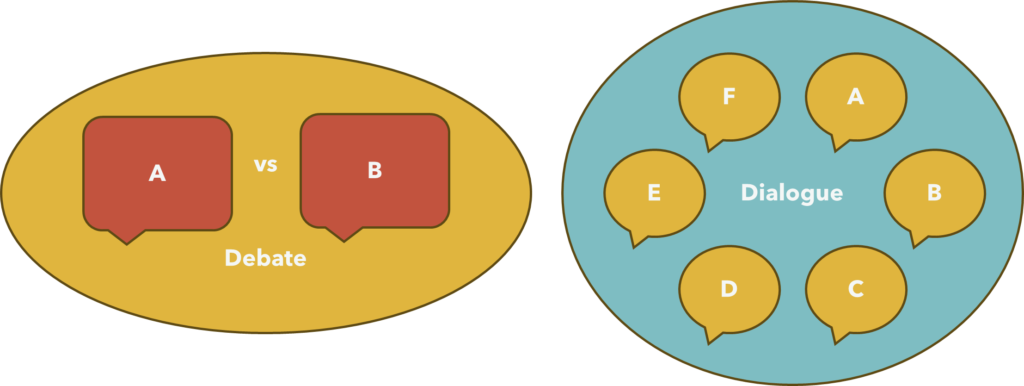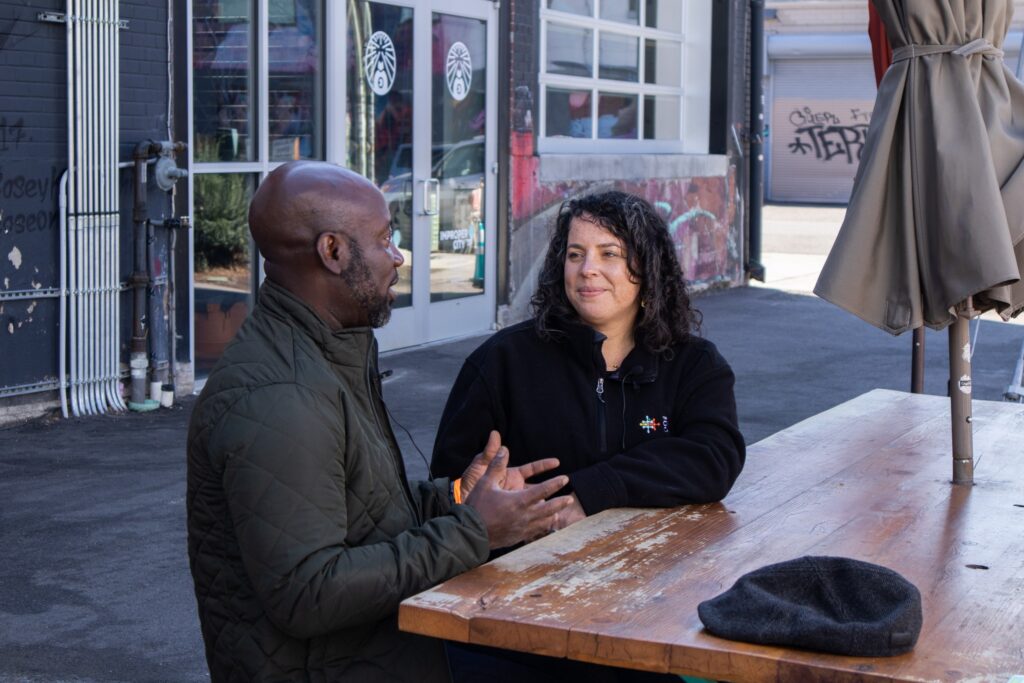How many times a day do you hear, “We should have a dialogue”? It’s a well-intended question because it recognizes that something needs to be discussed and talked about. The real question is: how many of these “dialogues” are actually Dialogues?
Dialogue vs. Other Types of Communication
We are going to attempt to unpack one of the most used words at the workplace right now. First, we are going to start by explaining what it is not. A dialogue is not a debate. A debate is a formal and structured form to communicate ideas. These ideas must survive strategic arguments from opponents. It’s simply an exchange of ideas so that one idea can win. Outside a formal setting of a debate, this shows up in workspaces as “arguments.” Both debates and dialogues consist of 2 or more people exchanging thoughts and ideas, but their aims are different. One is to win, and one is to understand. Often, in an argument, we tend to end things with, “We can agree to disagree.” What this really means is that neither idea won and the individuals holding those ideas are unyielding. There has been little to no understanding in this exchange.
Dialogue is also not therapy. An invitation to engage in a dialogue can be misunderstood as creating a safe place to share internal feelings and stories that are not suited to be supported by teammates. No one can take the place of an experienced professional who can help individuals unpack internal processes. This is important to mention because colleagues who are experiencing similar conflicts can start to support each other in well-intentioned ways and can blur the lines of emotional support vs thinking through something together. When work gets emotional and there are internal challenges for any person(s), they must have resources to access professional support for mental well-being.
What is Dialogue?
So what is a dialogue? And when do you know that you are engaged in a constructive dialogue?
A dialogue is a space where multiple ideas (not just two) can come together and get a fair chance at examination, expression, and exploration. A dialogue takes a debate to a new level where ideas are not only exchanged but ideas are shared with everyone’s position and perspective for context. This allows for others to understand where the idea is coming from and what is making someone share this idea.

In a dialogue, all ideas are given a fair chance. All ideas are given the chance to be expressed, to be questioned (examined), and to be explored. A dialogue makes space for all ideas and individuals to be valued while also undergoing scrutiny. This doesn’t mean that every idea will be accepted or should be accepted. This just means that every idea has a chance to be understood. The only winner in a dialogue is the dialogue itself. The process of the dialogue creates space for multiple ideas to sit side by side, even in polarity, and that process is the ultimate winner.

A dialogue sparks critical thinking and improves a group’s ability to solve complex problems through the lens of understanding. Rather than “agreeing to disagree,” a dialogue creates the conditions to hear statements such as:
- I didn’t see it that way before
- I now see where you are coming from
- What you are saying also makes sense to me because of your position
- Your perspective actually supports my own rather than stands in opposition
- I am wondering if all of these ideas can exist at the same time
- I am curious about finding a solution that can be a best fit with all these considerations
While participants in a dialogue won’t say exactly those statements, the essence of those statements will rise to the surface. You see, a dialogue provides unique conditions for expression, examination, and exploration.
Expression
Expression is when individuals are inspired to make their thoughts explicit. Individuals express what they are thinking in response to a topic, issue, or conflict. Multiple ideas and perspectives are invited to be expressed and a dialogue makes space for ideas that have not been yet stated or for someone to express something “different” than what is currently being said. As ideas are expressed, individuals may have new ideas that they didn’t have before they entered the dialogue space. This becomes a collaborative process for “thinking together.”
Examination
After ideas are expressed, all perspectives are given a fair trial for questioning. Everything that is said goes through a Socratic Inquiry process. Socratic Inquiry tests each idea to see if it can be held through examination. Not all ideas can withstand examination and individuals will be able to say things like:
- That’s a good question and I don’t think I have an answer that fits this puzzle
- I don’t think I can respond to this question with the information I have
- I am not sure my idea can support this right now
Instead of someone being told that their idea is “bad” or “not meaningful, examination allowed participants to arrive at that discovery on their own. People are more likely to support setting aside ideas that cannot withstand compared to ideas that do not go through questioning.
Exploration
Exploration is for ideas that make it through examination. In this part of the dialogue, individuals explore creative ways to combine ideas or prioritize ideas. This is the beginning of problem-solving for a group. Groups will start to wonder what it means to combine ideas or support more than one idea for a problem. Groups will also get inspired to create solutions that have not been thought about before and can opt to create a task force to continue working on solutions.
This process of dialogue allows individuals to go beyond reacting to others’ ideas but also thinking critically about impact. The process of thinking together is the catalyst for finding solutions that work for everyone, not just one person.
Next time you think that your group needs a dialogue, we encourage you to make space for these steps for dialogue to see what can be discovered.


